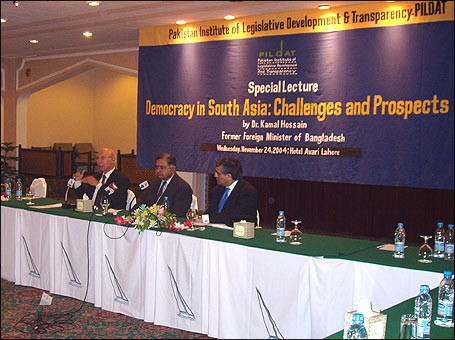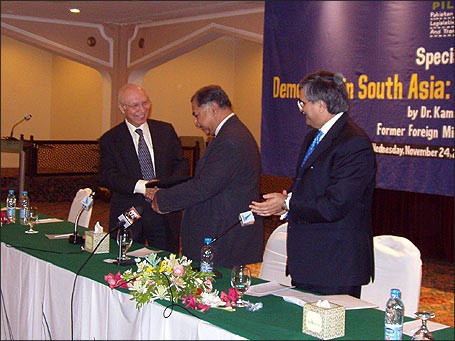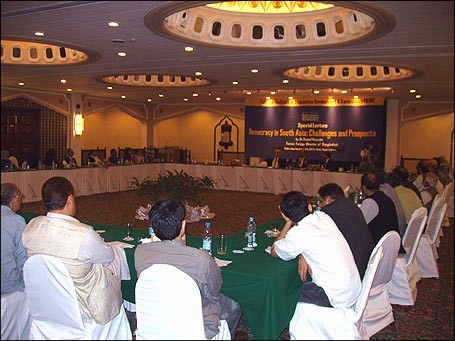|
|
| |
| EVENTS |
|
|
> Former Foreign & Law Minister of Bangladesh on
��Democracy in South Asia; Challenges and Prospects�
Special Lecture by Dr. Kamal Hossain |
|
|
| |
|
|
| |
| Introduction |
Dr. Kamal Hossain, Former Foreign & Law Minister of
Bangladesh delivered a Special Lecture on the topic of Democracy in South
Asia: Challenges and Prospects under the auspices of Pakistan Institute of
Legislative Development And Transparency � PILDAT on November 24, 2004 at
Hotel Avari Lahore.
The session was chaired by Mr. Sartaj Aziz, Former Federal Minister of
Foreign Affairs and Finance and was attended by prominent personalities from
all walks of life such as Members of the Punjab Assembly, officials of the
Punjab Assembly, students, media persons and Civil Society representatives,
etc. Prominent among the gathering were former President of Supreme Court
Bar Association Mr. Hamid Khan, Gen. (retd.) Nishat Ahmad, Principal Officer
American Consulate Mr. Brian Heath, Vice Consul Mr. Brian George, Director
British Council Lahore Dr. Iftikhar Ilahi and Mr. F. S. Aijazuddin, etc. |
| |
| Introduction of the Speaker |
Dr. Kamal Hossain is a Senior Advocate Supreme Court of Bangladesh and has
been Chairman of the Constitution Drafting Committee, Constituent Assembly
of Bangladesh. Apart from Foreign Affairs and Law, he has also held the
portfolio of Petroleum and Minerals as a Minister in the Government of
Bangladesh. A Senior Advocate of the Supreme Court of Bangladesh by
profession, Dr. Kamal Hossain received his bachelors and doctoral degrees in
law from University of Oxford, England. He has been Vice-Chairman,
Bangladesh Bar Council and President of the Supreme Court Bar Association of
Bangladesh. He has also been active on the international scene in the area
of human rights and has served as election observer Commonwealth Election
Observers Group in South Africa, SAARC Election Observers� Mission, Pakistan
and Sri Lanka, member of Hong Kong Pre-Election Mission, member, Human
Rights Mission to Indonesia relating to situation in East Timor and UN
Special Rapporteur on Afghanistan. |
| |
| Lecture by Dr. Kamal Hossain |
Dr. Kamal Hossain welcomed the opportunity to speak and share his thoughts
and experiences on strengthening democracy in South Asia at the PILDAT
forum. He believed that sharing of experiences in the region on this issue
was crucial. Analysts from South Asia have reflected on the shared 50 year
history to analyse the expectations that people of subcontinent had of
independence from the colonial rule, he said, as the region had set on the
post colonial journey with a similar set of expectations.
All constitutions are autobiographies of their respective nations as they
reflect the aspirations of the people which have been shaped by historical
experiences. Constitutions ensure political equality and freedom which must
be used to achieve social and economic justice. Constitutions serve as
vehicles for achieving political and economic empowerment of the people, he
held. Sharing his experiences of drafting the Constitution of Bangladesh, he
said that articulating the aspirations of the people in a constitution is a
daunting task and an enormous responsibility of reflecting peoples� yearning
for a political, social and economic order. Legislators have a huge
responsibility to represent their people and make decisions on their behalf
and therefore have to be very cautious and responsible towards making their
decisions, he held.
Dr. Hossain believed the real challenge of a democratic order is to make the
constitution come to life and fulfill the promises a constitution holds out
to the people. Democracy building in South Asia is still a work in progress
in this regard. Even in India, which has seen a systemic continuity of
democracy, a lively debate and a discussion is still going on about the
deficits of constitutional order. Analysing the case of Pakistan and India
he said that the democratic process was brought to a halt many times in the
history of the two countries. Major issue has been the systematic weakness
of the legislatures in the process which has hampered the growth of
democracy even during democratic periods. Without strong and empowered
legislatures, no real empowerment of the people can take place, he said.
Discussing the problems encountered in fulfilling the promises that
constitutions hold, he quoted Indian Prime Minister Jawahar Lal Nehru who
described the most difficult tasks he had to face during his premiership as
follows: �building a just society by just means� and �building a secular
place where religious feelings affect people so strongly.� Dr. Hossain
believed that these problems bear relevance not only to India but also to
Pakistan and Bangladesh since independence. India was fortunate to have
continuity of democracy and democratic leadership. He said he can not help
but wonder that if Mr. Jinnah and Liaquat Ali Khan were alive for a longer
period after independence, the situation in Pakistan would also have been
different.
Dr. Kamal Hossain believed that one of the major causes for lack of
sustainable democracy in the region was that the process of transition from
colonialism to post colonial democratic state could not be triggered in the
positive and constructive direction. Pakistan and Bangladesh have a shared
history therefore the problems were the same initially. There was uneven
distribution of power; executive had more powers and legislature was not
able to put a check on it even before any military intervention. The
shortcomings of the colonial rule were carried on in almost all the
departments. To make matters worse, there was a trend of official secrecy;
public was denied information and colonial legacies persisted to the
detriment of the society. Independence from colonial rule meant that people
of subcontinent were no longer subjects but citizens of their respective
independent democratic countries. The general populace had expected
democracy to prevail which meant empowerment of the people but after the
independence this could not materialize, he said. He quoted what he termed
as an illuminating insight by Mahmood Mamdani, a post-colonial historian of
Africa, an anthropologist and author of the book �Citizen and Subject:
Contemporary Africa and the Legacy of Late Colonialism� that after
independence the status of the people is changed from subjects to citizens
and this is declared so in the Constitution, but the relationship between
rulers and the ruled does not immediately get transformed into reality. It
is so because the attitude of the subject towards the rulers, and the
attitude of the ruler toward the subject is not easy to change.
Dr. Kamal Hossain said that the shared history of 24 years of Pakistan and
Bangladesh shows that the attitudes of police and administration, etc. were
very different from what was expected after independence. This critical
change in the mindset was not brought about. Those who were expected to
bring about this change of altering the attitudes were the legislators. But
the legislators themselves needed to change their mindset to understand and
employ the power vested in them to oversee the administration. The control
and oversight by elected representatives over those who were exercising
executive power was slow in emerging. This, believed Dr. Kamal Hossain, is
the sad part of the history that institutional evolution and growth of
legislatures did not take place as sovereign institutions empowered to
represent the people, legislate on their behalf and oversee the executive.
Discussing the pre-1971 phase of Pakistan, he said that democracy was never
given a chance to thrive and it was subjected to various forms of
manipulation. The Chief Secretary or the Governor represented the Centre and
not the people in the smaller provinces which were manipulated by the
centre. The true democratic set up implies that those who are formally in
control are supposed to be under the control of elected representatives but
reality during that period defied that commitment, he added. The initial
distribution of power right after the independence in 1947 was not according
to the democratic norms as various power centres were injected in the system
of governance. Parliament and Assemblies were weakened deliberately and
executive accumulated more and more power without any system of checks and
balances.
Dr. Hossain said that the key to strengthened and sustainable democracy in
the region is to ensure a system of conducting free, fair and transparent
elections is available. People should be given their basic right to vote for
the candidate of their choice and there should be no manipulation of any
kind to gain political ends. Empowerment of the people will in turn ensure
less political corruption and will ultimately lead to equal distribution of
power which is the basic requirement of a democratic society. People should
build up a consensus among themselves to be vocal about their political
rights regardless of differences in caste, creed or ethnicity. In order to
raise awareness in people, the enlightened elite have to speed up their
efforts and work relentlessly to uphold the values of democracy in society
so that the monopoly of predatory elites has to be minimised. Election
Commissions should be ensured absolute autonomy and all their provisions
should be clearly defined that must entail the power to hold inquiries and
enforce their decisions in the lights of those. Media, he felt, was a
crucial institution towards change and democratisation and needed to be
mobilised to stimulate awareness in people about their fundamental political
rights to ensure exercise of choice.
Praising the role and efforts of PILDAT as an independent and non-partisan
institution dedicated to strengthening democracy, he said that such
institutions were required in the entire region to accelerate the process of
democratisation. It is very crucial for the civil society to have the
courage to criticise the wrongs in an autocratic setup and work towards
strengthening democracy just as it is crucial to have a space to criticise,
he added.
Answering a question about the ways and means to stop military
interventions, he said that the solution in this regard is to put in place
an independent, powerful and objective election commission which should
ensure free and fair elections. In Bangladesh�s Constitution, it was written
that there should be elected administrative members or representatives on
all levels of state as a bulwark against military intervention. The
situation is far from perfect over there as well but it is necessary to have
elected representatives at the helm of affairs. The structure of civil
society and military must also be defined and power must rest in the hands
of Legislature. Democracy is always vulnerable to powerful interests
therefore concerted efforts must be undertaken to eliminate threats to
democracy. True democracy means that people are empowered for exercising
their choice without manipulation and holding their elected representatives
responsible, he held.
|
| |
| Synthesis by Session Chair |
As the Chair of the Session, Mr. Sartaj Aziz summarised the issues that Dr.
Kamal Hossain highlighted during his lecture to uphold the democratic values
in a given society including holding of free and fair elections, dealing
effectively and quickly with political corruption and the need to change the
attitudes and the role of media, bureaucracy and the military. Mr. Sartaj
Aziz commented that democracy could be strengthened only through creating a
positive synergy between these factors which becomes increasingly more
difficult once the democratic process is interrupted by military
interventions. Once democracy is interrupted, the process of empowerment and
transition does not take place, institutions get weaker, vested interests
become stronger and money has a larger role to play, he added. Mr. Aziz
believed that Dr. Hossain offered a sobering analysis of the task Pakistan
faces in terms of building democracy and strengthening democratic
institutions, adding that research and sharing of best practises on these
issues was required in the region.
Mr. Sartaj Aziz held that one reason for the smooth flow of democracy in
India is that after its independence, it realised that a chunk of its
territory � one fourth � was taken away from it by immigrants who had come
from outside the country and divided it, and wanted to avoid further
division in the future. India was not one nation like Pakistan and had eight
(8) major religions, several languages, several hundreds sects and ethnic
groups, etc. Indian leadership realised from the very beginning that they
could not build national unity without the democratic process; hence from
1947 they adopted 14 national languages while 4 more languages were
recognised and added to the list recently. Pakistan did not learn any lesson
from that as Urdu, which was neither the language of Bengal, nor Punjab,
Sindh, Frontier and Balochistan, was adopted as one national language. It
was this issue of the national language in Pakistan which was one of the
reasons for the separation of East Pakistan, he added. In India, a
well-demarcated structure of provinces and their functions was introduced to
counter differences; the Sikh independence movement in Indian Punjab was
weakened each time there was an election. India, hence, preserved the unity
of its nation only through democratic process and this became the motivation
to politicians, despite corruption, not to question democracy, he said.
Mr. Aziz believed that the key point that emerges out of Dr. Kamal Hossain�s
lecture is the importance of the empowerment of people as without
empowerment, there is no democracy. Empowerment of the people depends upon
political and economic power structures. Socialist countries draw their
power from the grass roots i.e., the poor while in truly democratic
societies, public is empowered as ultimately the electorate elects its
representatives. In countries where both these models are not operational,
the political and economic power is controlled by vested interests, feudal
landlords or tribal lords or bureaucracy which serve as the main obstacle to
empowerment. Change is difficult in such an environment as the election
process is controlled and dominated by them to perpetuate the power
structure. In such a scenario, a civil society movement of one kind or the
other is required on various issues such as politics, minorities, education,
human rights, etc that can snatch power as otherwise the power structure is
too strong to allow change and empowerment of the people, he said.
Mr. Sartaj Aziz thanked Dr. Kamal Hossain for his sharing of thoughts while
praising the role of PILDAT in providing such a forum for discussion.
In the end Mr. Ahmed Bilal Mehboob, Executive Director PILDAT thanked the
chief guest Dr. Kamal Hossain and the session chair Mr. Sartaj Aziz for
their invaluable input. A PILDAT Memento was presented to Dr. Kamal Hossain
to commemorate his lecture and interaction at the PILDAT Forum.
|
|
|
| |
|
|
| |
|
|
| |
|
|
| |
|
|
| |
|
|
| |
|
|
| |
|
|
| |
|
|
| |

(From left to right) Mr. Sartaj Aziz, Dr. Kamal Hossain and Mr. Ahmed Bilal Mehboob |
|
| |
|
|
| |

(From left to right) Mr. Sartaj Aziz presenting a PILDAT Memento to Dr. Kamal Hossain while Mr. Ahmed Bilal Mehboob claps on |
|
| |
|
|
| |

Participants at the Lecture |
|
|
|
|
|
|
|
|